He called himself, when required to state his occupation, a surveyor. In fact, he had never surveyed anything and wouldn’t have known how to go about it. His work consisted simply in sitting at this desk from nine-thirty till five, answering the phone, sending out bills and keeping the books. He knew his work back to front, inside out, but it still caused him anxiety, for Auntie Gracie’s standards were always before him.
“Never put off till tomorrow what you can do today, Arthur. Remember if a job’s worth doing, it’s worth doing well. Your employer has reposed his trust in you. He has put you in a responsible position and it’s up to you not to let him down.”
Those, or words like them, had been the words with which she had sent him off to be Grainger’s boy a week after his fourteenth birthday. So he had swept up better than anyone else and made tea better than anyone else. When he was twenty-one he had attained his present responsibility, that of seeing to it that every customer of Grainger’s got his roof mended better than anyone else’s roof and his kitchen floor laid better than anyone else’s kitchen floor. And he had seen to it. He was invaluable.
Dear Sir , Arthur typed, I note with regret that the Rosebud de Luxe sink unit (type E/4283, pastel blue) was not, in fact
Barry Hopkins slouched into the office, chewing bubble gum.
“Hi.”
“Good morning, Barry. A little late, aren’t you? Do you know what time it is?”
“Round half nine,” said Barry.
“I see. Round half nine. Of all the lackadaisical, feckless …” Arthur would have liked to advise him to go over to the works and ask for a pound of elbow grease, but the young were so sophisticated these days. Instead he snapped, “Take that filthy stuff out of your mouth.”
Barry took no notice. He blew an enormous bubble, like a balloon and of a pale shade of aquamarine. Leaning idly on the window sill, he said:
“Old Grainger’s comin’ across the yard.”
Arthur was galvanised. He composed his face into an expression suggestive of a mixture of devotion to duty, self-esteem and simpering sycophancy, and applied his hands to the typewriter.
4
————
Anthony Johnson had no furniture. He possessed nothing but a few clothes and a lot of books. These he had brought with him to 142 Trinity Road in a large old suitcase and a canvas bag. There were works on sociology, psychology, his dictionary of psychology, and that essential textbook for any student of the subject, The Psychopath , by William and Joan McCord. Whatever else he needed for reference he would obtain from the British Museum, and from that excellent library of criminology—the best, it was said, in London—housed in Radclyffe College, Kenbourne Vale. In that library too he would write the thesis whose subject was “Some Aspects of the Psychopathic Personality,” and which he hoped would secure him from the University of London his doctorate of philosophy.
Part of it, he thought, surveying Room 2, would have to be written here. In that fireside chair, presumably, which seemed to be patched with bits from a woman’s tweed skirt. On that crippled gate-leg table. Under that hanging lamp that looked like a monstrous joke-shop plastic jellyfish. Well, he wanted his Ph.D and this was the price he must pay for it. Dr. Johnson. Not, of course, that he would call himself doctor. It was Helen who had pointed out that in this country, the land of such anomalies, the bachelor of medicine is called doctor and the doctor of philosophy mister. She too had seen the funny side of being Dr. Johnson and had quoted epigrams and talked about Boswell until he, at last, had seen the point. But it was always so. Sometimes he thought that for all his Cambridge First, his Home Office Social Science diploma, his wide experience of working with the poor, the sick and the deprived, he had never woken up to awareness and insight until he met Helen. She it was who had turned his soul’s eye towards the light.
But as he thought this, he turned his physical eye towards Stanley Caspian’s green-spotted fingermarked mirror and surveyed his own reflection. He wasn’t a vain man. He hardly ever thought about the way he looked. That he was tall and slim and strongly made with straight features and thick fair hair had never meant much to him except in that they denoted health. But lately he had come to wonder. He wondered what he lacked that Roger had; he who was good-looking and vigorous and—well, good company, wasn’t he?—hypereducated with a good salary potential, and Roger, who was stupid and dull and possessive and couldn’t do anything but win pistol-shooting contests. Only he knew it wasn’t that at all. It was just that Helen, for all her awareness, didn’t know her own mind.
To give her a chance to know it, to choose between them, he had come here. The library, of course, was an advantage. But he could easily have written his thesis in Bristol. The theory was that absence made the heart grow fonder. If he had gone to his parents in York she could have phoned him every night. He wasn’t going to let her know the phone number here—he didn’t know it himself yet—or communicate with her at all except on the last Wednesday in the month when Roger would be out at his gun club. And he couldn’t write to her at all in case Roger intercepted the letter. She’d write to him once a week. He wondered, as he unpacked his books, how that would work out, if he had been wise to let her call the tune, make all the arrangements. Well, he’d given her a deadline. By November she must know. Stay in prison or come out with him into the free air.
He opened the window because the room smelt stale. Outside was a narrow yard. What light it received came from a bit of sky just flicked at its edges by leaves from a distant tree. The sky was a triangular patch because most of it was cut off by brick wall meeting brick wall diagonally about four yards up. In one of these walls—they were festooned with pipes betwigged with smaller pipes like lianas—was a door. Since there was no window beside it or above it or anywhere near it, Anthony decided it must lead down to a cellar.
Five o’clock. He had better go out and get himself something to cook on that very old and inefficient-looking Baby Belling stove. The hall smelt vaguely of cloves, less vaguely of old, unwashed fabrics. That would be the bathroom, that door between his and Room 1, and that other one to the right of old Caspian’s table, the loo. Wondering what sort of a woman or girl Miss Chan was and whether she would get possession of the bathroom just when he wanted to use it, he went out into the street.
Trinity Road. It led him via Oriel Mews into Balliol Street. The street names of London, he thought, require an historical treatise of their own. Someone must know why this group in Hampstead are called after Devon towns and that cluster in Cricklewood after Hebridean islands. Were the Barbara, the Dorinda and the Lesly, after whom roads are named just north of the City, once the belles of Barnsbury? Did a sorcerer live in Warlock Road, Kilburn Park, and who was the Sylvia of Sylvia Gardens, Wembley, what is she, that all our maps commend her? In that corner of Kenbourne Vale, to which his destiny had drawn Anthony Johnson, someone had christened the squalid groves and terraces after Oxford colleges.
A cruel joke cannot have been intended. The councillor or town planner or builder must have thought himself inspired when he named Trinity Road, All Souls Grove, Magdalen Hill, Brasenose Avenue, and Wadham Street. What was certain, Anthony thought, was that he hadn’t been an Oxford man, had never walked in the enclosed quadrangles of that city or even seen its dreaming spires.
Such a fanciful reverie would once have been alien to him. Helen had taught him to think like this, to see through her eyes, to associate, to compare, and to dream. She was all imagination, he all practical. Practical again, he noted mundane things. The Vale Café for quick, cheap snacks; Kemal’s Kebab House, smelling of cumin and sesame and fenugreek, for when he wanted to splash a bit; a pub—the Waterlily, it was called. Just opening now. Anthony saw red plush settees, a brown-painted moulded ceiling, etched glass screens beside and behind the bar.
Читать дальше











